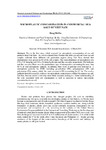Please use this identifier to cite or link to this item:
https://thuvienso.bvu.edu.vn/handle/TVDHBRVT/20162Full metadata record
| DC Field | Value | Language |
|---|---|---|
| dc.contributor.author | Dang, Thi Ha | - |
| dc.date.accessioned | 2021-06-24T07:52:32Z | - |
| dc.date.available | 2021-06-24T07:52:32Z | - |
| dc.date.issued | 2021 | - |
| dc.identifier.uri | http://thuvienso.bvu.edu.vn/handle/TVDHBRVT/20162 | - |
| dc.description.abstract | This is the first study which assessed the microplastic contamination of sea salt productsfromVietNam. Theresults obtainedfrom9 iodatefine tableseasaltand4 rawseasalt samples collected from different salt production regions along Viet Nam showed that microplastics were present in 9/9 of the salt samples. The mean abundance of microplastics was 878 ± 101 items/kg and 340 ± 26 items/kg for raw and fine sea salts, respectively. For both raw and fine sea salts, fibers were the predominant type of microplastics, accounting for more than 60 % of total microplastic particles. In addition, three types of polymer were detected in 12 microplastic particles by FTIR, including polyethylene (PE), polypropylene (PP) and polystyrene (PS), among which, the most common is PE (accounting for 67 %). The results, gatheredfromthisresearch,evidencethemicroplasticcontaminationwithinVietnameseseasalt, and thus, become crucial to develop more future research, leading to a better understanding of the risks associated with salt consumption as well as measures to reduce microplastic contaminationinseasalt. | vi |
| dc.language.iso | en | vi |
| dc.relation.ispartofseries | Vietnam Journal of Science and Technology, 59(3) 2021;pp. 333-344 | - |
| dc.subject | Microplastic | vi |
| dc.subject | Sea salt | vi |
| dc.title | Microplastic contamination in commercial seasalt of VietNam | vi |
| dc.type | Article | vi |
| Appears in Collections: | CNTP-KTHH - Xây dựng (Articles) | |
Files in This Item:
| File | Description | Size | Format | |
|---|---|---|---|---|
| Dang-Thi-Ha-Journal-of-science-and-Technology.pdf | 1,72 MB | Adobe PDF |  Sign in to read |
Items in DSpace are protected by copyright, with all rights reserved, unless otherwise indicated.